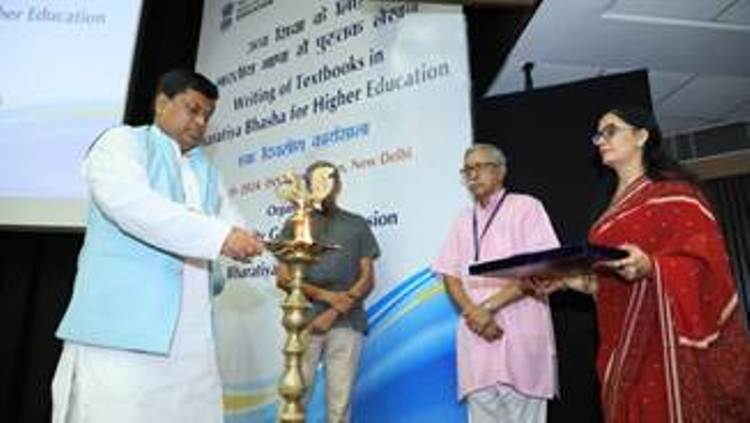The Minister of State for Education, Dr. Sukanta Majumdar, inaugurated a one-day workshop for Vice Chancellors on the writing of textbooks in Bharatiya Bhasha for higher education in New Delhi today. The event was a joint effort by the University Grants Commission (UGC) and the Bharatiya Bhasha Samiti (BBS).
The workshop saw the presence of key figures including Secretary of the Department of Higher Education, Ministry of Education, Shri K. Sanjay Murthy; Chairman of the Bharatiya Bhasha Samiti, Prof. Chamu Krishna Shastry; Chairman of UGC, Prof. M. Jagadesh Kumar; and Vice Chancellors from over 150 universities, along with eminent academicians and other dignitaries.
In his inaugural address, Dr. Sukanta Majumdar emphasized the critical need for study materials in Indian languages for higher education courses. He pointed out that the education system must reflect India's vast linguistic diversity and provide students access to knowledge in their mother tongues. Dr. Majumdar thanked Prime Minister Shri Narendra Modi for his visionary leadership towards a 'Viksit Bharat' and highlighted the role of the National Education Policy 2020 in motivating the youth for nation-building. He also acknowledged Shri Dharmendra Pradhan for leading the implementation of NEP 2020.
Dr. Majumdar stated that Indian languages embody the nation's ancient history and the wisdom passed down through generations. He stressed the importance of nurturing the young generation's belief in their rich cultural and linguistic heritage.
During the session, Prof. Chamu Krishna Shastry discussed the necessity of developing a Bharatiya Bhasha Ecosystem, while Shri M. Jagadesh Kumar shared valuable insights on the initiative.
In the valedictory session, Shri K. Sanjay Murthy launched three significant projects: ASMITA (Augmenting Study Materials in Indian languages through Translation and Academic writing), Bahubhasha Shabdkosh, and Real-time Translation Architecture. He highlighted the pivotal role of technology in these projects and the substantial contributions expected from NETF and BBS.
ASMITA, a UGC-led initiative in collaboration with Bharatiya Bhasha Samiti, aims to produce 22,000 books in the next five years across 22 scheduled languages. Bahubhasha Shabdkosh, led by the Central Institute of Indian Languages (CIIL) and Bharatiya Bhasha Samiti, will create a comprehensive multilingual dictionary repository. The Real-time Translation Architecture, spearheaded by the National Education Technology Forum (NEFT) and Bharatiya Bhasha Samiti, aims to enhance real-time translation capabilities in Indian languages.
Over 150 Vice Chancellors participated in the workshop, grouped into 12 "Manthan Satra" sessions dedicated to developing textbooks in 12 regional languages: Punjabi, Hindi, Sanskrit, Bengali, Urdu, Gujarati, Kannada, Malayalam, Marathi, Tamil, Telugu, and Odia. Each group was chaired by the respective VCs of nodal universities, yielding valuable outcomes.
Key takeaways included the creation of new textbooks in Bharatiya Bhasha, establishing standard vocabularies for the books in 22 Indian languages, and identifying potential improvements for current textbooks. The discussions also emphasized incorporating Indian Knowledge Systems (IKS), blending practical and theoretical knowledge. A Q&A session allowed panel members to address queries from the participants.
The workshop marked a significant step towards enriching higher education through the inclusion of Indian languages, aligning with the broader goals of the National Education Policy 2020.











